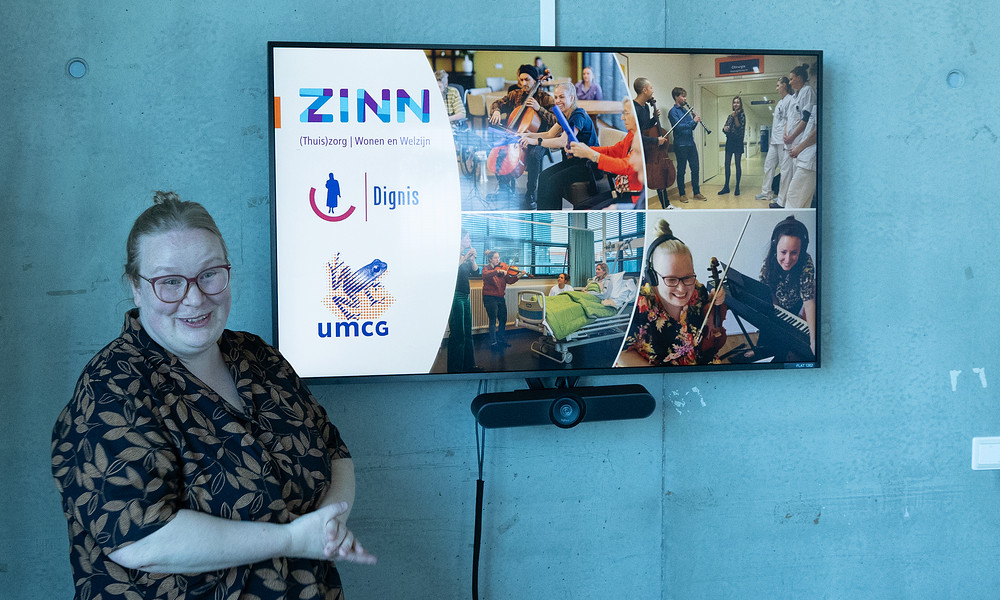Course for researchers: "Now I'm going to lead my own projects"
- News

Last year, 48 participants from 15 different universities of applied sciences followed the course 'Building blocks for successful practice-oriented research'. On Friday 19 June, the course concluded with a dragon's den at Hanze, in which the participants pitch their research proposal. Violinist Krista de Wit, researcher at the Music in Context research group of the Prince Claus Conservatoire (PCC) was one of the participants of the English course which was offered for the first time this year.
Text: Loes Vader
Photo: Jerem van Duijl
Krista de Wit was in the transitional phase from researcher to senior researcher when the course of the Taskforce for Applied Research SIA came her way. As someone from outside the Netherlands, she found that it is not always clear how all the regulations around research work. "I was looking for better opportunities for research in my marginal research area and I wanted to work on my own professionalisation. I was often part of projects that were led by others. Now I'm going to lead my own projects." Krista has just received a Comenius Senior Fellows grant of 100,000 euros to develop music in healthcare education across various disciplines. "The input from the course has certainly contributed to this," the researcher agrees.
Krista de Wit, who comes from Finland, started her career fifteen years ago as a music pedagogue in Sweden. In 2015, she did her PhD research at the PCC. She specialised in music in connection with health care and the social domain. "Now I am researching collaborative music making and interprofessional collaboration between musicians and other professionals," Krista explains. "In recent years, I have worked as a musician and researcher in hospital and in rehabilitation care. I also give training to students at the intersection of music and healthcare."
The course is not about research skills, but rather about competencies around conducting research. Krista: "How do you find the right applications and grants; how do you formulate your research question clearly and in detail? And how does your question relate to those of your professional field partners? During the course you are constantly reflecting: what are your strengths and how can you create even better opportunities for yourself? Aspects that are not directly related to technical research but are part of the research ecosystem."
Fifteen universities of applied sciences participated in the course and three researchers from each university of applied sciences. The course was offered in English for the first time this year.
Krista liked representing Hanze, and especially the Arts. "I think it's important that the perspective of well-being, healthy ageing and the role of art is seen." Networking is an important theme, Krista discovered. "A colleague from Rotterdam is researching poverty and homelessness among young mothers with small children. So perhaps we can work together in the future. We know that music can connect people and support them socially, mentally and physically. I also see this group of university of applied sciences researchers as a network."
Attention was also paid to the ethical aspects of research. Krista was in the course’s international group. "The group was multi-professional, which means not only that different disciplines come together, but also many different ways of doing research. How do others view research ethics and what does that mean for the dialogue between participants? I am all about participatory research, but there were many professionals who mainly do data research. It was very valuable to learn from each other."
The participants also set to work on their own research project. During the course, Krista was able to translate practical questions from Lentis Zuidlaren into a research application: could live music play a role in the connection between psychiatric clients, their loved ones and Lentis? "I would like to investigate how a relationship-oriented live music practice can create an equal place for clients, relatives, employees and musicians. This made for a very organic connection with the course. I am busy with the application and hope it works."
Krista ends with advice for lecturer-researchers who would also like to follow the course. "Even if you are Dutch, consider joining the international group. I have experienced the cultural exchanges as very enriching. You do need to be able to devote enough time for it, otherwise you won’t achieve much. Finally, think creatively. How can you use the building blocks you are given in different projects? I thought it was a unique opportunity to participate."
The course consists of 5 modules (in Dutch) that highlight different building blocks of practice-based research: a project proposal, strategic networking, question articulation and implementation, a research plan and project leadership. The participants can work with a number of skills according to their own needs. There is room for submitting your own questions. Attitude aspects that are paid attention to are: broadening the view to the entire research cycle, demand-orientation and impact, recognising the importance of knowledge communication and open access.
How satisfied are you with the information on this page?